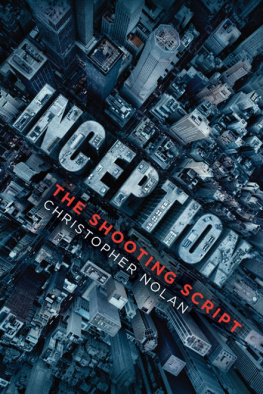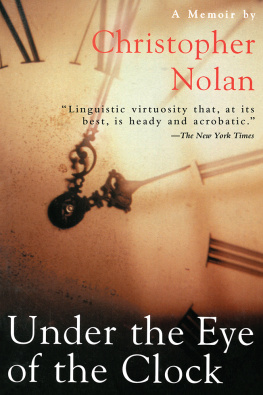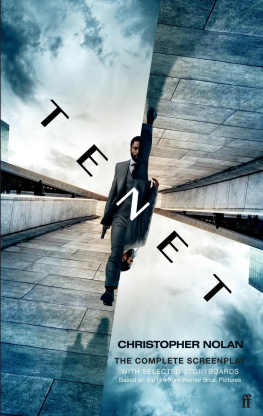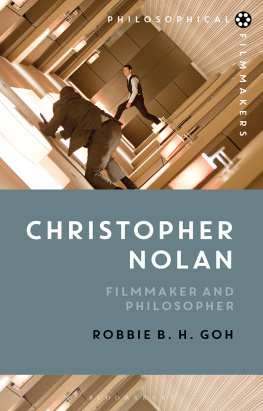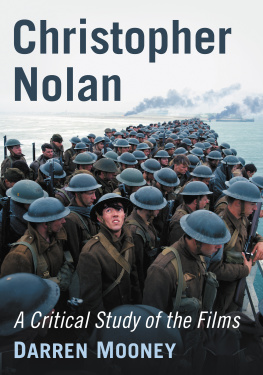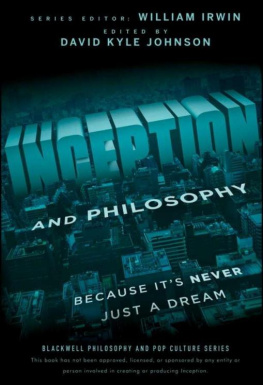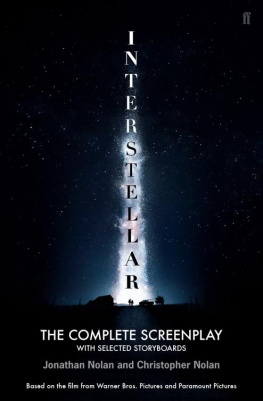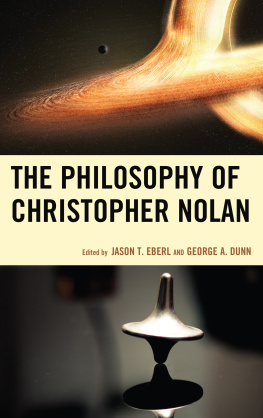INCEPTION
THE SHOOTING SCRIPT
CHRISTOPHER NOLAN
3160 Kerner Blvd., Suite 108
San Rafael, CA 94901
www.insighteditions.com
Copyright 2010 Warner Bros. Entertainment Inc.
INCEPTION, characters, names and related indicia are trademarks of and
Warner Bros. Entertainment Inc.
WB Shield: & Warner Bros. Entertainment Inc. (s10)
PALA23014
Storyboard art by Gabriel Hardman.
Concept art on pages 20-21 and 219 by Nathaniel West.
All rights reserved. No part of this book may be reproduced in any form without written permission from the publisher.
Library of Congress Cataloging-in-Publication Data available.
ISBN: 978-1-60887-015-8
Insight Editions, in association with Roots of Peace, will plant two trees for each tree used in the manufacturing of this book. Roots of Peace is an internationally renowned humanitarian organization dedicated to eradicating land mines worldwide and converting war-torn lands into productive farms and wildlife habitats. Together, we will plant two million fruit and nut trees in Afghanistan and provide farmers there with the skills and support necessary for sustainable land use.
Designed by Michel Vrna
Manufactured in the U.S.A.
10 9 8 7 6 5 4 3 2
FOR MY FATHER
BRENDAN JAMES NOLAN
Contents
DREAMING / CREATING / PERCEIVING / FILMMAKING
AN INTERVIEW WITH WRITER-DIRECTOR CHRISTOPHER NOLAN
INTERVIEWED BY JONATHAN NOLAN
Jonathan Nolan: Lets talk about the script. Youve been working on this one for a while.
Christopher Nolan: Ten years, I think.
JN: Is it ten? I was trying to remember the first time you talked to me about the idea because there were several different versions of cor-porate espionage scripts that you were playing around with.
CN: I was. Then I took the idea of corporate espionage and applied it to the thing Id been working on even longer, which was dreams.
I remember the initial genesis quite clearly. My interest in dreams comes from this notion of realizing that when you dream you create the world that you are perceiving, and I thought that feedback loop was pretty amazing. I remember when I was in college you had free breakfast that finished at nine oclock
JN: [laughs] That would be an important part of your life.
CN: It was very important. So you had to wake up to get the free breakfast and then you would go back to bed because you hadnt gone to sleep until four in the morning. But I would make sure I got it and then I would go back to sleep for another two or three hours. And in that slightly weird, discombobulated sleep I discovered that you can have active dreams, and that when you realize you are dreaming, you could control the dream.
I thought that was really amazing. I remember having a dream and saying to myself, Okay, theres a bunch of books on the shelf. If I pull a book off the shelf and look at it, can I read the words in the book? And I could, because your brain is making up the words in the book. Or you could be walking on a beach in your dream and pick up a handful of sand and youd be looking at all the grains and thinking, Well, my brain is putting all the millions of grains in this handful of sand.
What this immediately suggestsforgetting the alleged firewall between creation and perception in your brainis the infinite potential of the human mind. To me, that is what is exciting. Because we talk about this all the time, using the analogy of the computer for the human brain. I am always interested by things that seem to defy that analogy. And I think dreaming
JN: dreaming is a pretty good one.
CN: Yeah, because being able to create a whole world and to have a conversation with someone in a dreamyou feel like youre having a conversation, but youre putting all the words into that other persons mouth.
JN: Youre playing chess against yourself without realizing youre your own opponent.
CN: Yeah, which you cant do in waking life. Theres no form of shadow boxing like that while youre awake.
JN: I think the first time I ever considered the fact that dreaming is different than perception was when you first described how sophisticated it is to me. Its a fascinating insight into what the mind is truly capable of because dreaming is so much bigger than perception. And yet it doesnt seem like theres a lot of critical scientific research being done on it.
CN: I would imagine dreaming doesnt attract a lot of scientific interest because of its subjectivity. Its so anecdotal.
JN: The subject has also been yoked into slightly bizarre and obsolete theories about psychology that have tainted it a bit. But none of those theories are really technical, although the mechanics of dreaming are incredible.
CN: Yeah, and I think its possible to analyze those mechanics. Its when science and philosophy cross over, when this science of the human mind meets the philosophical edge, that I think people drift into abstraction. So what the film tries to do is keep it in the realm of science fictionto keep it in the realm of the mechanical and the relatable so it doesnt become abstract and incomprehensible. There are rules to the way the characters use dreaming, which defines reality, which defines the dreams they enter. The characters take great pride in knowing these rules and that they apply absolutely.
JN: You get this great set of rules because the premise is that the dreamer cant know theyre dreaming. You have to keep it bound. Its that much more exciting because it feels close to reality.
CN: I was definitely looking for a reason to impose rules in the story during the writing process. When I saw the first Matrix film, I thought it was really terrific, but I wasnt sure I quite understood the limits on the powers of the characters who had become self-aware.
Inception, on the other hand, is about a more everyday experience with dreaming. Its about a more relatable human experience. It doesnt question an actual reality. Its just saying, Okay, we all dream every night. What if you could share your dream with someone else? And it becomes an alternate reality simply because the dream becomes a form of communicationjust like using a telephone or going online. I wanted it, then, to have a rule set, a set of reasons that you could graph for why its not chaos and anarchyfor why it has to be order, and why you need architects and an architectural brain to create the world of the dream for the subject to enter.
JN: Everyone can be a Superman in their own dreams. But your protagonists approach the dream with expertise and subtletythe subtlety of the way they manipulate the dream.
CN: Yesexactly. Its about the subtlety and that is where the heist movie idea came from. Id been dealing with the world of corporate espionage and so forth, but as soon as you want to present the subtle art of conning somebody, of fooling somebody, then you enter the world of the heist movie. And that is when I consider this script to have begun, when I figured out that I was going to use a heist movie structure to wrangle these ideas in, which was about ten years ago.
The problem I had was finishing it, because the heist movie as a genre tends to be deliberately superficial. It tends to be glamorous. It tends to be light entertainment. And I realized that when youre talking about dreaming, when you are talking about this universal human experience, you need the stakes of the story to have a much more emotional resonance. So the risk were taking with genre in the case of Inceptionrather than it being science fiction meets James Bond or whatever those sorts of things areis saying, Okay, well take a heist movie and well give it massive emotional stakes.
JN: In a funny way, it actually takes dreaming back to a kind of Freudian, Jungian place that speaks to how your innermost secrets are locked away in your dreams. So instead of stealing money or something superficial, youre actually stealing something very, very important. Or in this case, implanting something very, very important.

